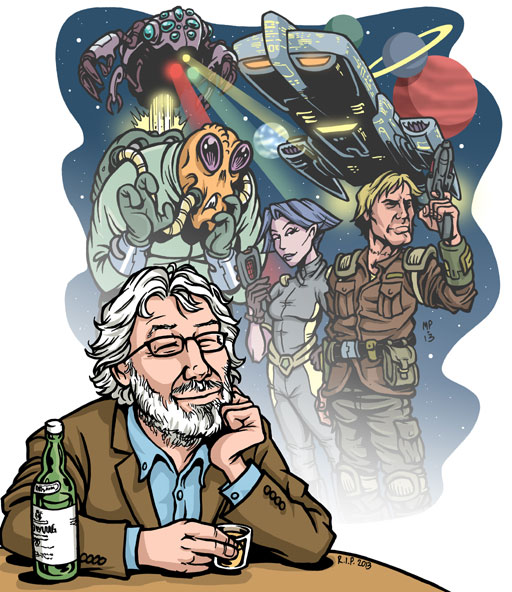
Iain Banks wrote literary novels and science fiction turn by turn for nearly 30 years. He banged out a piece of well-reviewed lit fic – this is not a derogatory way of putting it, just a reference to the smoking speed with which he always seemed to work – and then hoisted the M in the middle of his name to signal to the world that “Iain M Banks”, the world’s most penetrable pseudonym, was about to embark on some SF. His readerships and his reputations overlapped a bit; nevertheless, he really did have two careers. In his final blog post, he took time amidst the immense dignity of his update on his gall bladder cancer to quash the idea someone had mooted, that he’d been writing SF all this time to cross-subsidise the proper literachewer. It was the other way round, he pointed out. His straight novels outsell the SF fourfold or fivefold. It’s the science fiction that’s the subsidised labour of love, the impractical art pursued as a vocation.
Reading this as someone who’s principally a fan of Banks-with-an-M made immediate sense to me. (And made me even sadder at the cruelty with which his time has been cut short by the cancer.) Because while he was a good novelist, he was a great SF writer: an iconoclast, a changer of the landscape of imagination, a once in a generation talent. Let me try and explain why, for those of you who happen not to have read him, who maybe haven’t seen reason to dip much into SF at all. In particular, let me try and explain why this part of his work ought to be cherished by British atheists, in whose company he was proud to number himself (Unlike me, but let’s not talk about that today.) Some of this will be a bit of a reach. Thanks to the specific choices he made, it is possible for a new reader to bounce back, baffled. Nick Hornby, for instance, famously threw his hands up in comic despair when he tried Excession, one of the very best of the books. But it is worth persisting.
Back in the mid-’80s, when Banks had made his (literary) name with The Wasp Factory, and was contemplating his perverse swallow-dive into genre, there were, roughly speaking, two available ways of doing SF. (I exaggerate and simplify.) With immense difficulty, over the course of the 1960s and 1970s, the better writers within the field had dragged it away from its pulp roots; they had brought in good prose and ambitious characterisation; they had opened it to politics, to feminism, to formal experimentation; they had redirected it away from the traditional subject-matter of adventure in space and Things With Tentacles, and pointed it instead at plausibly-rendered near futures, at psychological exploration of the alien within. “Cyberpunk” was the movement of the moment, with William Gibson’s glittering neo-noir Neuromancer trilogy as its defining success. Serious SF was expected to be in this tempered literary mould: if not Gibsonian explorations of the Reaganised or Thatcherised street, and the uses it found for digital technology, then anthropological seriousness à la Ursula le Guin, or dystopic seriousness to befit the threat of nuclear war. Because the only other way of doing it was the tacky, vestigial tradition of writing about rayguns and starships and galactic empires: still going, thanks to Star Wars, but tending to be practised only by the naive, the nostalgic, the conservative, or the featherbrained. “Space opera”, so called, was an embarrassing low-status leftover.
So which would an ambitious, high-minded, young Scottish socialist choose, as he bounced on the end of the springboard over the genre lagoon? Why, Option B. Naturally, Option B. Of course, Option B. Banks’ first SF novel, Consider Phlebas, featured interstellar space battles, settings measurable in parsecs, and characters called things like Juboal-Rabaransoa Perosteck Alseyn Balveda dam T’seif. I can remember reading it and feeling as if an electric fan supercharged to hurricane speed were blowing at me out of the pages every time I opened it. Also, feeling mightily puzzled, for from the TS Eliot allusion in the title onwards, this spectacularly un-serious-seeming story seemed to want to carry me to some serious and even melancholy places.
Banks was not alone. He was joined in the turn back toward space opera by a whole suddenly-assembling group of British writers, Colin Greenland and Alistair Reynolds, Stephen Baxter and Paul McAuley, plus the 1970s SF grandee M John Harrison, who had never quite given up on it in the first place. Among other things, it was for all of them a move towards narrative vigour, a kind of counterpart in writing to the punk/new wave return to rock’s danceable ’50s roots, after the wafty complexities of the prog scene. It worked as a kind of heavily ironic declaration of independence from American SF – taking over what had been the old heartland of the American future, with very different aims and (often) politics.
But Banks had noticed something else besides, it became clear as book followed book, each one a firework display of the disgraceful. He had seen that the bigness of pulp – the apparently naive splendour you get when you pop the scale of the expected by envisioning a whole planet pierced through like a Chinese puzzle, or a cosmos bursting with intelligent life, tentacled and otherwise – also prised open a kind of philosophical space, a domain in which a popular art could give serious elbow room to ideas, could let them unfurl experimentally on the grandest of stages. “In widescreen baroque”, as he put it himself. Especially ideas which had been seen as being just as disreputable as rayguns ’n starships.
Banks’ SF series twirled the narrative focus around with virtuoso ease, but the books almost all shared a background: the Culture, a post-scarcity utopia populated by trillions, where humans and machine intelligences shared a plenty that made money irrelevant, and could flick away any challenge. “Basically, hippies with enormous guns”, Banks joked cheerfully in interview. But the Culture was more than wish-fulfillment for leftists. Insouciant though it was, superbly casual though it always insisted on being in its outflanking of tyrants, it was a serious attempt (with the finest pulp tools) to imagine a state of existence beyond necessity, where stories would all be driven by conflicts of character rather than the pinching of environments, and, unnecessary tragedies dispensed with, some kind of irreducible bedrock of genuine sorrow would come into view. Like all serious utopians, Banks maintained a tender eye for mortality and heartbreak. The Culture was not a place for happy ever after. Often (Look to Windward, Matter) it was a place for farewells, for entropy unflinchingly acknowledged.
Much of the time of course, with an irony Banks entirely registered and relished, it had to fade to the literal background of the narrative, so that he could go on telling distinctly pre-utopian stories, as dark as might be expected from the author of The Wasp Factory. Then we tended to get the Culture represented by “Special Circumstances”, the Culture’s far-from-stainless corps of meddlers. Then, the offstage loom of utopia became a critical device, throwing into lurid question the cruelties we might have shrugged at if the Culture weren’t available as contrast. A bright background darkened the foreground. He made his boldest experiment on these lines in The State of the Art, when a Culture contact team slips quietly into orbit around our very own Earth, circa 1978. The ordinary defects of our actual history shock these impressionable Chekists rigid, and having decided against intervention on moral grounds, the best they can do is take symbolic revenge by culturing stray cells of our nastiest dictators for a dinner party. “Most of you over there will be eating either Stewed Idi Amin or General Pinochet Chili Con Carne; here in the centre we have a combination of General Stroessner Meatballs and Richard Nixon Burgers... there are in addition scattered bowls of Fricasséed Kim Il Sung, Boiled General Videla and Ian Smith in Black Bean Sauce...”
Now, as this dandy cannibal satire on the Last Supper suggests – blasphemy of a grade you just don’t see much, nowadays – Banks also engaged, with the creation of the Culture, in a piece of sly, prolonged and magnificent anti-theism. I don’t so much mean because, here and there, he used his wide screen for explicit attack on elements of religion, as in Surface Detail’s Hieronymus Bosch-worthy demonstration of the repulsiveness of the idea of hell. I mean that the Culture itself represents an elegant absorption of, and therefore displacement of, one whole department of religious yearning. It offers, in effect, a completely secular version of heaven. With its sentient ships as omniscient as any pantheon of gods, and a lot more obliging and benign, and its vision of human nature uncramped from disease and hunger and oppression, and its rationalised equivalent to transcendence, it gives its inhabitants (and you as you read the books) all the pie in the sky they could possibly want; but transformed by being made wholly material, by being brought within the reach of human aspiration. Where religion, on the Marxist reading of it, is a kind of comprehensible counsel of despair, the heart of the heartless world, Banks supplies a counsel of optimism. The handwaving physics and the cheerful vagueness of the economics don’t matter. The Culture is a declaration of imagination’s power. It wants to demonstrate that a materialist imagination can reach just as far as a religious one; further, even, since it can encompass within the order of nature everything that religion must reach outside nature to dream up. Give us enough real sky, says the Culture, and the pie will follow. Plus rayguns!
Iain Banks’ medical bad news was the kind of catastrophe that even utopia cannot exclude, as his own utopia showed for decades, with stoic melancholy. For him, we need to imagine a properly science-fictional counterpart to the honour guard of books that Proust had standing watch over the death of a novelist, silent in respect in every bookshop window. Explode the bookshop, for Iain Banks. Stretch its space out into immensity. And through the huge dark, set gliding in respectful procession the Culture’s Ships, kilometres across, each as vast in proportion to mortal human bodies as our imagination is; but not silent, no never that; all talking, all chattering in negligent grandeur, threading laughter, menace, wit, hope, wrath, through the vacuum, vaster still, where we must find our meaning for ourselves.
This piece is from the July/August issue of New Humanist. Subscribe
This is the cover story for the Jul/Aug issue of New Humanist magazine, out on 20 June. We have published it early to honour the life and work of Iain Banks, a great friend of New Humanist and a great loss.

